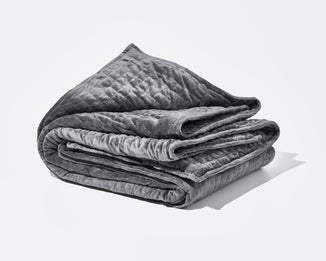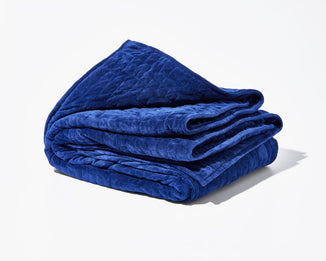
Dec 24, 2021
How Much Sleep Do You Really Need?
Sleeplessness — the ability to go through life without needing any sleep — is a popular superhero power that many people would give anything to have. After all, who doesn’t wish they had more hours in the day to get things done? But in reality, insufficient sleep comes with a host of short- and long-term consequences — from increased stress responsivity and moodiness to a higher risk of heart disease and even early death.

Given how detrimental a lack of sleep can be to our health, it’s no wonder why more and more people are turning to weighted blankets, earplugs and other sleep aids to help them get a good night’s sleep. But in your quest to get more shut-eye, you may start to wonder: how much sleep do you really need?
While there is no one-size-fits-all answer to how much sleep you should get, there are helpful guidelines that can inform your sleep schedule. Ahead, we’ll discuss a few of the factors that determine how much shut-eye a person needs to function their best.
How Much Sleep Should You Get Each Night?
Many of us grew up believing that we all need eight hours of sleep each night. But as it turns out, that’s not entirely true. In fact, our sleep needs change as we get older.
According to the Centers for Disease Control and Prevention, here’s how many hours of sleep per day a person should get based on their age:
- 0 – 3 months: 14-17 hours
- 4 – 12 months: 12-16 hours
- 3 – 5 years: 10-13 hours
- 6 – 12 years: 9-12 hours
- 13 – 18 years: 8-10 hours
- 18 – 60 years: 7 or more hours
- 61 – 64 years: 7-9 hours
- 65 years and older: 7-8 hours
So, you should base your sleep needs on this chart alone, right? Not so fast. The chart above provides a helpful starting point for determining your sleep needs, but it may not be accurate for everyone.
Here’s the thing: When you go to sleep, your brain cycles through different stages of Non-REM and REM sleep. For most people, each cycle lasts roughly 90 minutes, which means they need roughly 7.5 hours of sleep on average to complete each cycle.
However, some people’s sleep cycles are shorter or longer. That’s why some people can get by on fewer hours of sleep, while others need more shut-eye to avoid the cognitive problems typically associated with insufficient sleep.

Signs You’re Getting Too Little/Too Much Sleep
Sleep is a vital restorative function, but as with most things in life, it’s best in moderation. In fact, one study found that both short sleepers and long sleepers experienced a greater decline in cognitive function than people who slept for a moderate amount.
So, how do you know if you’re hitting the sleeping sweet spot every night? Here are a few signs you may be getting too much or too little sleep:
- Memory issues
- Tiredness throughout the day
- Low productivity
- Mood changes
- Symptoms of anxiety
- Increased appetite
Tips for Getting Optimal Sleep
Struggling to get the perfect amount of sleep for your age? Here are a few tips to help you land in the Goldilocks zone of sleep:
- Stick to a regular sleep schedule. Waking up and going to bed at a consistent time every day helps you maintain your circadian rhythms, the body’s internal clocks that signal when it’s time to rest and when to be alert. So, make sure you’re keeping a consistent sleep schedule — even on the weekends.
- Avoid sleep-disrupting foods and drinks. Caffeine, alcohol and heavy or spicy meals can disrupt your sleep, especially if you consume them right before bedtime.
- Limit your exposure to nighttime light. Consider hanging up blackout curtains in your bedroom to block out street lights. If that doesn’t do the trick, you can also wear a weighted sleep mask to create pitch black in any environment. (As a bonus, it applies soothing pressure to your eyes!)
- Avoid overly-long naps. Napping for too long can derail your nightly sleep schedule. To prevent this, try to keep your naps under 15 minutes or skip them altogether.
- Keep your bedroom on the cool side. Turn down the thermostat an hour or so before bedtime. If you’re a hot sleeper, consider investing in breathable bedding, like a cooling weighted blanket and bamboo sheets that wick away moisture.
- Ditch the tech before bed. Bright light from televisions, smartphones and other electronic devices can suppress melatonin production, making you feel wide awake come bedtime.
- Pay a visit to your doctor. If you’ve already made the changes above but still worry you may be over- or under-sleeping, make an appointment with your doctor. They can run a few tests to help you rule out any underlying conditions that could be ruining your sleep.

The Bottom Line
So, how much sleep do you really need? It all depends on your age and genetics. Some people can get by on less than the recommended amount of sleep for their age, while others need more to function properly. The best way to determine your ideal amount of sleep is through self-evaluation. Start with the recommended amount based on your age and experiment with different sleep durations until you find the sweet spot.
Ready to take your sleep to the next level? Start getting the sleep you deserve with a Gravity Weighted Blanket today.
Get Your Gravity Weighted Blanket
Your use of this website, its content, and any products obtained through this website is at your own risk. This website, its content, and any products obtained through this website are provided on an “as is” basis, without any warranties of any kind, either express or implied, including warranties of merchantability, infringement of intellectual property, or fitness for any particular purposes. No warranty or representation is made with respect to the completeness, reliability, quality, or accuracy of this website or its content. This website, its content, and any products obtained through this website do not constitute medical treatment and is not a substitute for a medical examination or diagnosis. If you are dealing with a health condition check with your health care provider before using. This website may contain affiliate links that allow us to earn a commission on purchases made through such links. We may accept forms of advertising or sponsorships in connection with this website. There might also be paid topic insertions. We may accept and keep free products, services, and other forms of compensation from others.



